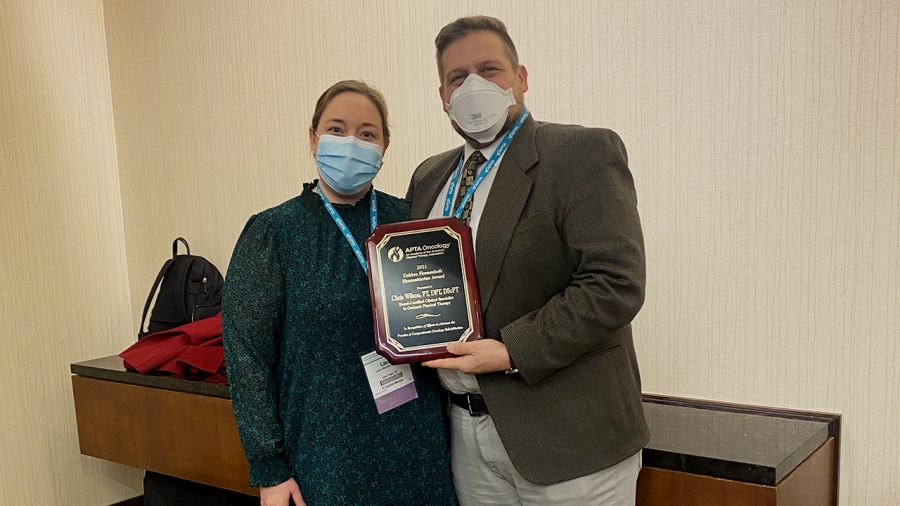Professor Wilson receives awards from American Physical Therapy Association
Photo courtesy of Oakland University News
Dr. Wilson with President of the Academy of Oncologic Physical Therapy Laura Sheridan. Dr. Wilson received two awards from the Academy.
On Feb. 4, Dr. Christopher Wilson, associate professor and director of clinical education in the physical therapy program at Oakland University, was honored with two awards at the American Physical Therapy Association’s (APTA) combined sections meeting. Dr. Wilson received the President’s Award and the Debbra Flomenhoft Humanitarian Award from the Academy of Oncologic Physical Therapy.
The President’s Award was given to Dr. Wilson to recognize his efforts and service to APTA Oncology. The Debbra Flomenhoft Humanitarian Award honors those whose work has resulted in the advancement of the practice of compassionate oncology rehabilitation, heightening the understanding of cancer illness and psychosocial rehabilitation issues, as well as demonstrating patient advocacy.
“The recognitions were so meaningful because it helps me say that we’re on the right track,” Dr. Wilson says. “We are really making an impact [by] improving the education of physical therapy students to be better prepared to work with people with cancer and just advancing the science of cancer rehabilitation even more.”
Dr. Wilson’s well recognized success also stems from his ability to address the problems frequently associated with cancer treatments. According to Dr. Wilson, the number one side effect that people reporter after cancer treatments is fatigue — they feel exhausted and washed out because the treatments have physiologically affected their nerves.
“One of the things that we notice and that research shows is that exercise is one of the best things for cancer treatment — to the point where every person who is diagnosed with any type of cancer [or] is getting treated for cancer needs to be on an exercise program,” Dr. Wilson says.
Dr. Wilson also believes the role of a physical therapist for cancer patients is undervalued. He feels that a physical therapist should play an ongoing role in cancer rehabilitation.
“You can have symptoms that develop weeks to months — even years after cancer treatments are done. Even once a person has been cured or stabilized they may still experience fatigue or they might end up having range of motion restrictions that happen years after their issues,” Dr. Wilson says. “[Patients] need to have an established relationship with a therapist even through periodic check ups, so we’re trying to teach therapists how to do [this] across the United States.”
Dr. Wilson has also been a huge part in changing policy for the APTA. One of Dr. Wilson’s contributions was establishing the position that patients who may not survive their cancer deserve treatment just as much as those who are cured or stabilized.
“Some people think, ‘why would we do rehabilitation or do physical therapy on someone who’s facing a life threatening illness and may be dying?’ My response to that is, well, they aren’t gone yet. They haven’t passed away yet. They still have a lot of living to do,” Dr. Wilson says. “I don’t think it’s very ethical for us as a profession to abandon them when they need therapy the most.”
Dr. Wilson’s vast knowledge on the practice of physical therapy in the area of cancer and oncological diagnoses is not just impacting the APTA, but also new generations of students whom he teaches who will shape the field of physical therapy.
“Cancer is the number two killer in the United States, and we need you know we have a skill set that can help improve the quality and length of life of these individuals. It’s our job to prepare ourselves and step up to the plate,” Dr. Wilson says. “I think it’s really important for us to acknowledge that no matter what setting our students are going to be working in, they will see people with cancer. It’s not something we should run away from. It’s not something we should be afraid of. It’s something that we should embrace. We’re helping to solve a major public health issue and helping to save and improve the lives of people [for] as long as they have left.”








